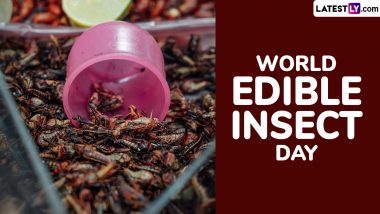Are you willing to try salad topped with cockroaches, worms or maybe some crunchy fried crickets? Sounds creepy, right? But did you know eating insects has a lot of health benefits and it’s environment-friendly? World Edible Insect Day is observed annually on October 23, highlighting the intriguing aspects of adding insects to your diet. As strange as it may sound, a majority of the world’s population eats insects as a regular part of their diet. While eating bugs and crickets may not seem appetising, researchers and health experts are of the opinion that insects are a sustainable alternative protein source with nutritional benefits that you can’t ignore. On World Edible Insect Day 2024 today, we bring you some fun facts about consuming the creepy crawlies.
The thought of having a meal that includes insects might churn your stomach, but the practise is common across many areas around the globe, largely due to its nutritional benefits. According to a report by the United Nations, not only are insects a great source of protein and other nutrients, but an insect-based diet is also more environment-friendly. It seems to be a potential solution to the world’s food crisis. Even big names in Hollywood, such as Angelina Jolie and Zac Efron, have already taken their first bite of this alternative produce. Before you approach the world of entomophagy, following are the fun facts you must know about eating insects. October 2024 Festivals, Events and Holidays Calendar: Complete List of Important National and International Days and Dates.
- Historical Practise: Throughout history, entomophagy has been a common practise in many cultures. In some societies, insects were considered a delicacy and were also reserved for special occasions, while in others, they were a staple food. The roots vary depending on culture and region.
- Nutritional Benefits: Insect proteins have a good range of amino acids, and they also contain vitamins, minerals, and unsaturated and polyunsaturated fatty acids. Termites are rich in mineral manganese, which plays a role in metabolism and is essential for strong bones and immune function.
- Environment-Friendly: Insect farming is considered a more sustainable practise because insects don’t need much space. They can live anywhere, under any conditions and are easy to feed. Insects are more environment-friendly than conventional livestock production.
- Versatile Cooking Methods: Insects can be eaten in a variety of ways. Pan-friend, boiled, roasted or baked, they can also be made into flour and used for bars and cookies.
- Abundance: Insects are in abundance. Some parts of the world have over 300 species of insects. So, there is something for everyone.
- Risks: While there are many benefits to eating insects, there are still potential risks. Insects can be contaminated with viruses, parasites, fungi, bacteria, pesticides, heavy metals and dioxins.
Despite its potential benefits, entomophagy has faced cultural and social stigmas in many parts of the world. However, recent efforts have been made to promote it as a sustainable and nutritious food source. Keeping the risks and health benefits of eating insects in mind, you can begin with small portions, if you are looking forward to add them in your diet.
(The above story first appeared on LatestLY on Oct 23, 2024 10:45 AM IST. For more news and updates on politics, world, sports, entertainment and lifestyle, log on to our website latestly.com).













 Quickly
Quickly





















